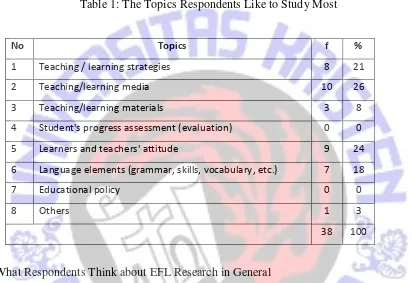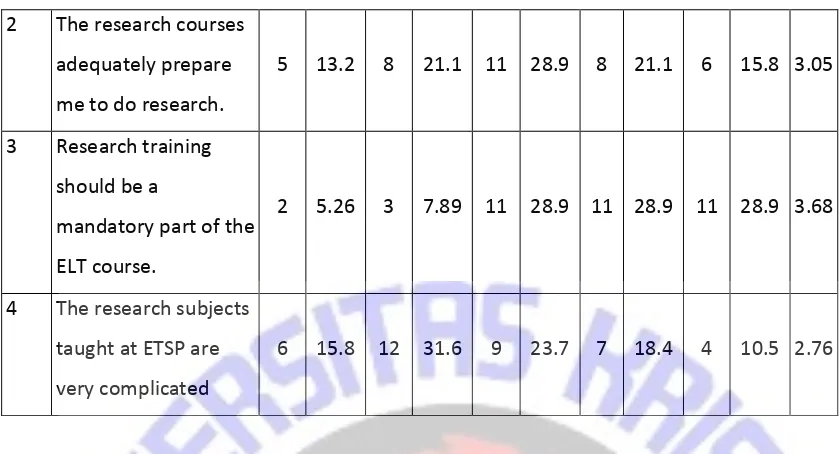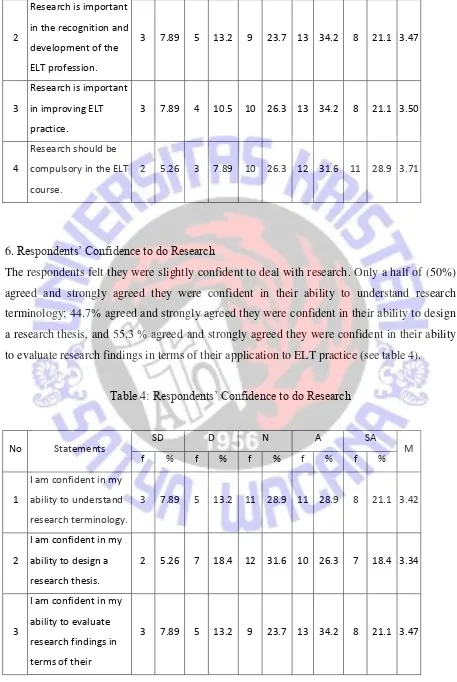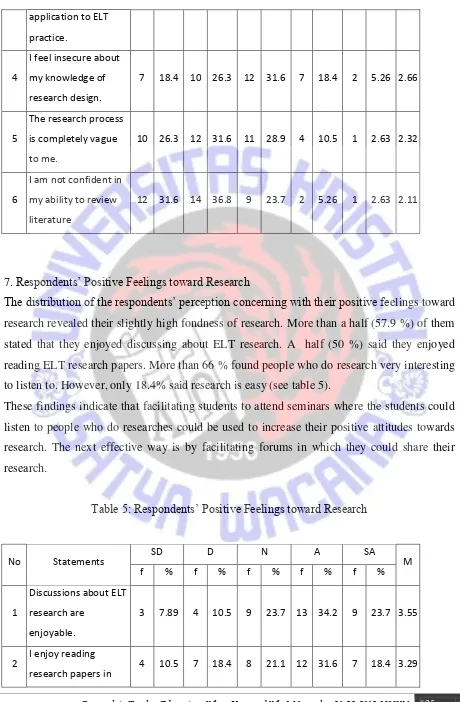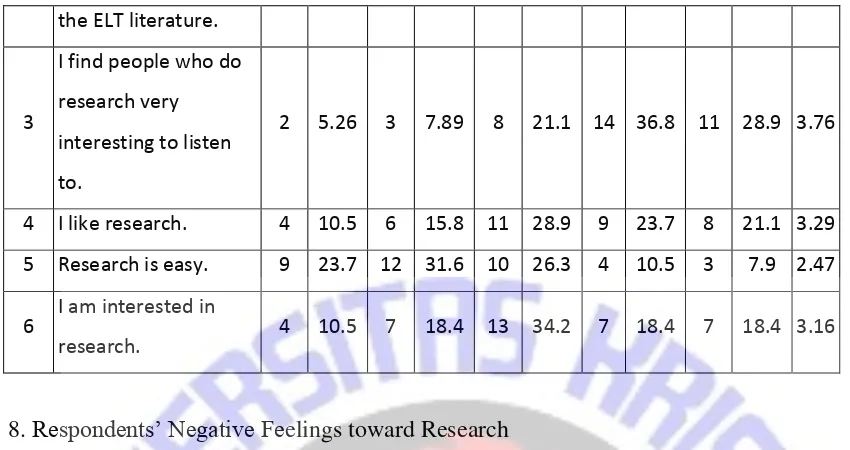Research in Teacher Education : What, How, and Why?, November 21-22, 2012, UKSW 617 undergraduate pre-service EFL teachers toward research in English Language Teaching (ELT). The respondents were 38 fourth year students of the English Education Study Program (ETSP) of the Christian University of Indonesia, Jakarta. They had just finished
conducting researches they need to write their ‘skripsi’ when this study was carried out.
Questionnaire responses supplemented by interview data were analyzed to understand the
respondents’ (1) views on research training in ETSP, ELT research in general and its role in the undergraduate program and their future career as English teachers; (2) attitudes toward research (including research methods and topics preference and the most problematic research components), and (3) confidence to do research. Findings indicated that the majority of the respondents were positive toward the overall concept of research in ELT. Classroom action research and survey appeared to be the most preferred methods, while the most
favored topics to study were teaching strategies and media and learners’ attitudinal factor. At
the end of this paper, implications and recommendations for future research are presented.
Keywords: Pre-Service EFL Teachers, attitudes, ELT research
Introduction
Various scholars have highlighted the high importance of research to develop teachers’
knowledge and competences. Kincheloe (2003, 18–19) argues that teachers’ engagement in
researches will enable them (1) to appreciate the benefits of research; (2) to begin to
research in developing teachers’ knowledge and practices, and emphasized its important
Research in Teacher Education : What, How, and Why?, November 21-22, 2012, UKSW 618 ‘The process of clarification [through research] illuminates the everyday theories people have that inform their conduct and their experiences, and hence the value of the research enterprise to help with this process through broadening the practitioner’s knowledge base and to aid a deeper understanding of both action and context. It should inform practitioners’ activities as knowledge workers and help them to help others, to learn in a highly structured and complex education system’ (p. 4).
Increasing interest in teachers’ engagement in research is also evident in the literature on
English language teaching (ELT). Numerous publications which advise ELT teachers on how
to do research have been published, such as the works of Allwright and Bailey (1991), Nunan
(1992), Freeman (1998), Burns (1999), Brown and Rodgers (2002), and McKay (2006).
Based on his survey on some works of ELT research, Borg (2006, p. 22-23) concludes that
when teachers inquire into their own practices, individually or collectively, that process
benefits teachers’ professional growth and pedagogical activity.
Despite the affirmation on the high importance of research, in reality, not many teachers
regularly carry out researches due to some inhibiting factors. McKay (2006, p. 1-2) lists three
factors which restrict teachers to undertake research. First, many teachers have not been
trained to undertake research. Often teacher education programs focus primarily on how to
teach, examining how to specify learning objectives, design lessons, and assess learning.
Little or no attention is given to training teachers to rigorously investigate their classrooms.
Second, many teachers have heavy teaching loads. Finally, teachers lack of support from
administrators. The results of some recent studies support McKay’s claim. Based on their
survey of 607 members of an international association for ELT professionals, Brown et al.
(1992) reported that the notions of research closely tied to quantitative and statistical methods
and a general ambivalence about the role of educational research in teachers’ professional lives caused teachers reluctant to do researches. Macaro’s (2003) study revealed that the
physical and conceptual inaccessibility of published language teaching research were a key
barrier to their engagement with it. Allison and Carey’s (2007) study disclosed that ELT
teachers felt constrained in their ability to engage in research due to their limited time left
available to them after they had fulfilled their teaching duties and their lack of encouragement
and motivation to do research.
Just like in other fields, research is the main means for developing new knowledge which is
Research in Teacher Education : What, How, and Why?, November 21-22, 2012, UKSW 619
in research is a great loss. It is, therefore, very important to overcome the problems that
restrict teachers to undertake research. Among the factors above, the teachers’ inaccessibility
of published language teaching research could be solved quite easily because the internet
presents innumerable ELT journals. Many of them are even free to access. The time
limitation and motivation to do research are closely related to the institutional policy. By
letting the principals realize the advantages their institution can get from their teachers
regular engagement in research, to a certain extent they will facilitate the development of a
research culture. Finally, teachers’ lack of the knowledge and skills to conduct research should be resolved by providing research relevant workshops and guidance.
More than one decade ago, Crookes and Chandler (1999) had cautioned the problem of
teachers’ lack of the knowledge and skills to conduct research. They argued that foreign
language teacher preparation programs do not prepare the teacher to engage in a process of
life-long learning, do not help teachers to use published research, and do not provide them
with a problem-solving orientation to their own classroom teaching. This argument indicates
that pre-service teacher education’s failure to provide students with research competence and
skills is the main reason why English teachers do not actively be engaged in research.
This is actually quite contradictive to the fact that the curriculum of most pre-service English
teacher programs does offer some subjects related to research. Research Methodology,
Introduction to Statistics, and Research in ELT are usually a central component of the
curriculum. Many pre-service English teacher programs have even included the skills to
operate SPSS in their curriculum. In addition, students are generally required to do a final
year undergraduate project, which means writing a research paper on a topic specifically
related to ELT. But why do the students still seem reluctant to be actively engaged in
research when they have been teaching? Are the research courses, tools, and experiences not
appropriate enough to enable them to conduct research? Is it because the students do not
appreciate research? Is research too complicated or boring to conduct?
This study was a trial to answer some of these questions, particularly those related to the
pre-service EFL teacher attitudes toward research in English Language Teaching. The decision to
focus attitudes in this study was inspired by Clemente’s (2001) argument that the concept of
attitude is one of the most important elements of the belief system of the teacher, hence, an
essential element to be considered within a language teacher education scheme. A proper
Research in Teacher Education : What, How, and Why?, November 21-22, 2012, UKSW 620
improving pre-service ELT teacher programs aimed to empower ELT teachers to conduct
research.
Methodology
Participants
The participants of this study were 38 pre-service EFL teachers who enrolled in fourth year
(eighth semester) of their 4 year undergraduate teacher education program at the Christian
University of Indonesia, Jakarta. There were actually 54 students enrolling in that semester.
However, it was assumed that to participate well in this study required certain experience in
undertaking research. Although the 54 students had passed the classes of Research
Methodology, Statistics for Social Sciences, Research in ELT, and Seminar on ELT Research
Proposal, only 38 of them had finished conducting a research required to write their
undergraduate thesis when this study was carried out. Therefore, only these 38 students were
invited to participate in this study.
Instrument
The instrument in this study was adapted from Rieder’s (2010) questionnaire used to
investigate students’ attitudes toward research. The questionnaire consisted of six sections. The first section deals with the respondents’ preference of research designs and topics. In this
section the participants responded by choosing one out of eight options they like most.
The second section explores what the respondents think about EFL research in general. It
aims to measure if undergraduates perceive research as (1) easy or difficult (2) necessary or
unnecessary (3) interesting/boring. The third section attempts to ascertain the role of research
in the undergraduate course and the attitudes of undergraduates toward the inclusion, or
otherwise, of research teaching and projects in the undergraduate program. Section four
probes respondent’s confidence to do research. The section aims to examine the confidence
of the undergraduates in understanding, designing and evaluating research in relation to
TEFL. The fifth section is about respondents, positive feeling towards research. The sixth
section deals with respondents’ negative feeling towards research. Each question on 2nd to
7th section was evaluated using a 5-point numerical scale. 1–2 represented disagreement, 3
Research in Teacher Education : What, How, and Why?, November 21-22, 2012, UKSW 621
Results and Discussion
The results are discussed below in relation to the sections of the questionnaire.
1. Respondents’ involvement in research.
Based on their responses to the question where they are in their research process for writing
undergraduate thesis, it was found that 32% were in data analysis phase; 39% were writing
the report; and 29% were waiting for thesis examination (see chart 1). This finding
ascertained that all of the respondents had had experience in research.
2. Respondents’ Research Design Preference
Based on their response to the question what design they like most to conduct for writing
their thesis, it was found that action research, survey, and correlational were the top three
Research in Teacher Education : What, How, and Why?, November 21-22, 2012, UKSW 622 3. Respondents’ Research Topic Preference
Their responses to the question what topic they like most to conduct for writing their
undergraduate thesis revealed that those related to teaching/learning media was the most
favorable. It was respectively followed by the area of learners and teachers' attitude,
teaching/learning strategies, and language elements (grammar, language skills, vocabulary,
etc.).
Table 1: The Topics Respondents Like to Study Most
No Topics f %
1 Teaching / learning strategies 8 21
2 Teaching/learning media 10 26
3 Teaching/learning materials 3 8
4 Student's progress assessment (evaluation) 0 0
5 Learners and teachers' attitude 9 24
6 Language elements (grammar, skills, vocabulary, etc.) 7 18
7 Educational policy 0 0
8 Others 1 3
38 100
4. What Respondents Think about EFL Research in General
The respondents tended to think that EFL research in general is necessary, interesting but
difficult. The distribution of the respondents’ perception on research in general revealed that their belief that research training should be made compulsory in the ELT course. More than a
half (57.8%) of them agreed and strongly agreed research should be a mandatory part of the
ELT course. Almost a half (44.7%) thought research interesting. However, only 36.9% of
them thought the research courses adequately prepare them to do research.
Table 2: Respondents Attitudes to Training of Research
No Statements SD D N A SA M
f % f % f % f % f %
1 Research is a very
Research in Teacher Education : What, How, and Why?, November 21-22, 2012, UKSW 623
Newell and Cunliffe (2003) found that a higher level of research exposure of a student would
correlate with positive attitudes towards research. The participants in this study had limited
direct experience to research (the research they had ever conducted was only the project they
needed to write their undergraduate thesis). To a certain extent, the low rate of response to the
sufficiency of the research courses to prepare them to do research was caused by this limited
exposure to research.
5. Perception on the Importance of Research
The distribution of the respondents’ perception concerning with the importance of research
revealed their belief of the importance of research in the development of ELT practice. More
than a half of the respondents agreed and strongly agreed with all statements in this section
(see table 3). This is supported by the fact that the response rates (as indicated by the
response mean scores) in this section were relatively high, i.e. ≥ 3.47 (of 5 scale).
Table 3: Respondents Perception on the Importance of Research
Research in Teacher Education : What, How, and Why?, November 21-22, 2012, UKSW 624
6. Respondents’ Confidence to do Research
The respondents felt they were slightly confident to deal with research. Only a half of (50%)
agreed and strongly agreed they were confident in their ability to understand research
terminology; 44.7% agreed and strongly agreed they were confident in their ability to design
a research thesis, and 55.3 % agreed and strongly agreed they were confident in their ability
to evaluate research findings in terms of their application to ELT practice (see table 4).
Table 4: Respondents’ Confidence to do Research
Research in Teacher Education : What, How, and Why?, November 21-22, 2012, UKSW 625
7. Respondents’ Positive Feelings toward Research
The distribution of the respondents’ perception concerning with their positive feelings toward research revealed their slightly high fondness of research. More than a half (57.9 %) of them
stated that they enjoyed discussing about ELT research. A half (50 %) said they enjoyed
reading ELT research papers. More than 66 % found people who do research very interesting
to listen to. However, only 18.4% said research is easy (see table 5).
These findings indicate that facilitating students to attend seminars where the students could
listen to people who do researches could be used to increase their positive attitudes towards
research. The next effective way is by facilitating forums in which they could share their
research.
Table 5: Respondents’ Positive Feelings toward Research
Research in Teacher Education : What, How, and Why?, November 21-22, 2012, UKSW 626
8. Respondents’ Negative Feelings toward Research
Findings concerning the respondents’ slightly high fondness of research were consistent with
the findings about their negative feelings to research. Only 23.7% agreed and disagreed they
would not enjoy working on a research thesis. Those who agreed and strongly agreed that
reading research papers is boring, research is stressful, and research make them stressful was
less than 30%. Since the response-rate to the statements that research is difficult and time
consuming was slightly high, it was possible that these two perceptions were the reasons why
they had negative feelings toward research.
Table 6: Respondents’ Negative Feelings toward Research
Research in Teacher Education : What, How, and Why?, November 21-22, 2012, UKSW 627
Conclusion
As revealed through the findings of this study, a majority of the respondents viewed research
necessary, important, and interesting. More than a half of them appeared to be positive
toward the overall concept of research in ELT. Their attitude to the research and its role in
their undergraduate course and future profession was quite positive, and they were slightly
confident about their ability to understand research and research terminology related to
English teacher education.
However, most of the respondents viewed research difficult. This was supported by their
perception that the research courses did not adequately prepare them to do research. Another
reason for this perception was that the majority of them did not yet read and discussed
research papers extensively.
The findings also indicated that to increase their positive attitudes towards research among
students, facilitating them to attend seminars where they could listen to people who do
researches could be used to increase their seemed quite strategic. The next effective way was
Research in Teacher Education : What, How, and Why?, November 21-22, 2012, UKSW 628
REFERENCES
Allison, D. and J. Carey. (2007). What do university language teachers say about language
teaching research? TESL Canada Journal 24/2: 61–81.
Allwright, D. and K. M. Bailey. (1991). Focus on the Language Classroom: An Introduction to Classroom Research for Teachers. Cambridge University Press.
Borg, S. (2006) Conditions for Teacher Research. In English Teaching Forum No.4. [Online]
Available: http://exchanges.state.gov/englishteaching/forum/archives /docs/06-44-4-d.pdf [10
June, 2009]
Brown, H. D. and T. S. Rodgers. (2002). Doing second language research. Oxford
University Press.
Brown, J. D., M. Knowles, D. Murray, J. Neu, and E. Violand-Sanchez. (1992). The Place of Research within the TESOL Organization. TESOL.
Burns, A. (1999). Collaborative action research for english language teachers. Cambridge
University Press.
Clemente, M (2001). Teachers’ attitudes within a self-directed language learning scheme. System Volume 29, Issue 1 , March 2001, Pages 45-67
Crookes, G. and Chandler, P. (1999). Introducing action research into post-secondary foreign
language teacher education. Second Language Teaching & Curriculum Center.
Freeman, D. (1998). Doing teacher research. Heinle and Heinle.
Kincheloe, J. (2003). Teachers as researchers: Qualitative inquiry as a path to empowerment
(2nd Ed.). Falmer.
Macaro, E. (2003). Teaching and learning a second language: a guide to recent research and
its applications. Continuum.
McKay, S.L. (2006) Researching second language classrooms. New Jersey: Lawrence
Erlbaum Associates, Inc., Publishers.
Newell, D. and Cunliffe, C. (20030. Attitudes toward research in undergraduate Chiropractic
students. Clinical Chiropractic, 6(3–4):109–119.
Nunan, D. (1992). Research methods in language learning. Cambridge: Cambridge
University.
Radnor, H. (2002). Rresearching your professional practice. Buckingham: Open University
Press.
Research in Teacher Education : What, How, and Why?, November 21-22, 2012, UKSW 629
Appendix
Attitudes of Pre-Service EFL Teachers toward Research
Dear participants,
This questionnaire aims to collect data for studying the attitudes of undergraduate pre-service EFL teachers at the English Teaching Study Program (ETSP) of the Christian University of Indonesia toward research in English Language Teaching (ELT). It consists of two sections. Please read each instruction and item carefully before responding. Please note that this questionnaire is anonymous. Please do not write your name or make any other markings that may identify you.
Thanks for participating.
Section A
To complete the following two items, put a check () in the appropriate block
1. Where are you in the research process?
(a) Data analysis.
(b) Thesis write up.
(c) Waiting for thesis to be examined
2. Among the followings, which design do you like most to conduct for writing your thesis?
3. Among the followings, which topic do you like most to study for writing your thesis?
(a) Teaching / learning strategies
(b) Teaching/learning media
(c) Teaching/learning materials
(d) Student's progress assessment (evaluation)
(e) Learners and teachers' attitude, perception
(f) Language elements (grammar, skills, vocabulary, pronunciation, etc.)
(g) Educational policy
Research in Teacher Education : What, How, and Why?, November 21-22, 2012, UKSW 630
Section B
To complete this questionnaire please indicate your agreement or disagreement degree by
putting a check () in the appropriate block.
(SD= strongly disagree; D= disagree; U= uncertain; A = agree; SA = strongly agree)
Statements SD D N A SA
1. Research is a very interesting subject.
2. The research courses adequately prepare me to do research.
3. Research training should be a mandatory part of the ELT
course.
4. The research subjects taught at ETSP are very complicated
5. Further training in research methodology is necessary.
6. Research training in the ELT course is NOT necessary.
7. Research is important for identifying and investigating
problems in ELT.
8. Research is important in the recognition and development of
the ELT profession.
9. Research is important in improving ELT practice.
10. Research should be compulsory in the ELT course.
11. Performing research is NOT an important part of an ELT
course.
12. Research subjects should be made elective in ETSP
curriculum.
13. I am confident in my ability to understand research
terminology.
14. I am confident in my ability to design a research thesis..
15. I am confident in my ability to evaluate research findings in
terms of their application to ELT practice.
16. I feel insecure about my knowledge of research design.
17. The research process is completely vague to me.
18. I am not confident in my ability to review literature
19. Discussions about ELT research are enjoyable.
20. I enjoy reading research papers in the ELT literature.
21. I find people who do research very interesting to listen to.
22. I like research.
23. Research is easy.
24. I am interested in research.
25. I do not or would NOT enjoy working on a research thesis.
26. Reading research papers is boring.
27. Research is stressful.
28. Research makes me anxious.
29. Research is difficult.
